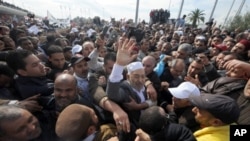All across North Africa and the Middle East, ordinary citizens have staged massive protests in recent weeks calling for the end to autocratic rule. They want better government, less corruption and greater economic opportunity. They come from all walks of life, including once-banned Islamic groups.
During his 23 years in power, former Tunisian President Zine El Abidine Ben Ali cracked down on opposition groups, including proponents of Islamic rule. But with Mr. Ben Ali now gone, Rachid Ghannouchi, the leader of the banned Islamist Ennahdha party, has returned to Tunisia after 22 years of exile. At the airport he greeted his supporters and brushed stereotypes aside.
"The Islamic movements run from Osama bin Laden to [Turkish Prime Minister] Recep Tayyip Erdogan, so why does the media want to make me look like a Bin Laden or [Iran's Ayatollah] Khomeini when I am more like an Erdogan?," Ghanouchi said.
Mixed Reaction in Tunisia
Public opinion in Tunisia is mixed on the issue. "Ghannouchi’s ideology is extremist and if we choose him, it will be like choosing another Ben Ali," said Adel Zouabi, a critic of Ennahdha.
"Neither Ben Ali nor Habib Bourguiba [first Tunisian president] gave the Islamists a chance. Why not give them a chance now?," said Mohamed Gharbi, a Ennahdha supporter.
Mr. Ben Ali branded Ennahdha an Islamic terrorist group, but some scholars see it as more moderate. Walid Phares at the National Defense University in Washington is the author of The Coming Revolution. He compares Ennahdha to the Muslim Brotherhood in Egypt or the AKP (Justice and Development Party) in Turkey.
"They want to increase their participation so that they are included in any government to come. But the real challenge would be once they are inside that government, inside that society, are they going to be calling for a full Islamist, emirates state or are they going to be like the AKP was?," he said.
Volatility in Libya
Ian Lesser, an adviser on North Africa to President Bill Clinton in the 1990s, says that is why the situation in Libya is so volatile. "There are many different ways in which Islamism of different kinds could come into play in Libya from legitimate political forces on the one hand to quite violent elements interested in international terrorism on the other," Lesser said.
There are others who worry about the threat of Islamic extremism, among them many world leaders.
"We do not want it to evolve into a dangerous direction with Islamist fundamentalism prevailing in the future of these societies," said Silvio Berlusconi, the Italian Prime Minister.
"This would mean decades of flames and further spread of extremism," said Russian President Dmitry Medvedev.
Muslim Brotherhood in Egypt
In Egypt, massive protests ended President Hosni Mubarak's 30 year rule and his crackdown of opposition movements, including the Muslim Brotherhood. John Esposito teaches religion and international affairs at Georgetown University. "The Muslim Brotherhood in Egypt for at least 40 years since the time of Sadat has operated within the system as a social and political movement, often delivering social services better than the government. It has functioned under a repressive regime," he said.
Nathan Brown at George Washington University says the Brotherhood has spawned radical movements, but he says it does not want to totally disrupt the existing society. "What they want is a gradual Islamification of the society and Islamification defined very generally. They just want people to know more about the religion," Brown said.
Islamic Salvation Front in Algeria
Like the popular uprisings in Tunisia and Egypt, Algerians also took to the streets. Ali Belhadj is one of the two leaders of Algeria’s banned Islamic Salvation Front also known by its French initials F.I.S. "The people are not afraid. It is the systems that are afraid. It’s a fallacy. They say it’s the people who choose, so let the people choose," Belhadj said.
The Islamic Salvation Front advocates turning Algeria into an Islamic republic. It was poised to win legislative elections in 1990, but Algeria's military-backed government cancelled the vote, sparking a civil war that cost tens of thousands of lives.
"The F.I.S. had come to power multiple times and had been re-elected and was seen as coming to power through a democratic process not just one election but through more than one election. When you look at places like Jordan, Kuwait, Turkey, Indonesia, Malaysia, you have Islamic parties or candidates who’ve served in parliament, who’ve been members of cabinets, who’ve served as deputy prime ministers and even prime minister of a country, so there is track record out there," said Esposito.
Past governments in Tunisia and Egypt raised fears of Islamic extremism to partly justify their autocratic rule. But Esposito and other experts say each country is a separate reality. They say religion can play a legitimate role in politics, as well as have a more extremist agenda.




